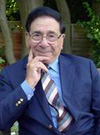Roy Calne,
Professor Emeritus of Surgery
Calne was born in Richmond, Surrey, educated at Lancing College and had his medical training at Guys Hospital in London, where as a student he asked if one of his young patients, suffering from kidney disease, might have a kidney graft to save his life, but he was told that this could not be done. Nevertheless in 1959 after qualifying and working at a number of London hospitals he had a chance to return to this subject at the Royal Free Hospital and the Royal College of Surgeons, where he started to work on the technique of kidney grafting and the obstacle of rejection. Preventing organ graft rejection has been his main interest. With early encouraging results in London he received a Harkness Fellowship to continue his studies at Harvard Medical School. He was the first to use drugs to control the rejection of donated organs and this led to an enormous expansion of organ grafting worldwide. He was the first to develop and use Azathioprine, Cyclosporine, Rapamycin and Campath in organ transplantation.
In 1965 as Professor of Surgery in Cambridge he started a kidney transplant programme in Cambridge and he performed the first liver transplantation operation in Europe in 1968. He was elected as a Fellow of the Royal Society in 1974 and knighted in 1986. He received a number of academic awards and honorary degrees and in 2012, together with Dr Thomas Starzl, he was awarded the Lasker DeBakey medical research award for the development of liver transplantation. He received the Pride of Britain award for Life Time Achievement in 2014. Currently he is Visiting Professor at the National University of Singapore involved in collaborative research with University College London and Cambridge Medical School on the experimental development of gene therapy for treatment of diabetes.
|

|
|
